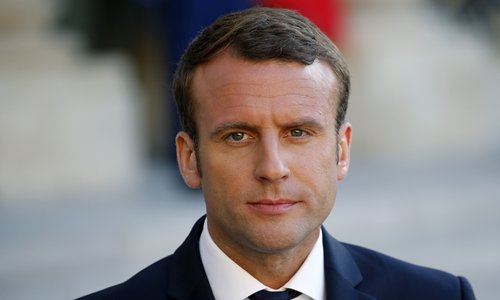Paris bid to expand G7 will fail

French President Emmanuel Macron Photo: VCG
Prior to the upcoming G7 summit in Biarritz, France, which begins on Saturday, British Prime Minister Boris Johnson met with German Chancellor Angela Merkel on Wednesday and will hold talks with French President Emmanuel Macron on Thursday. Brexit is reportedly the main topic of the talks. To some extent, this shows that compared to some other topics of the G7, the European countries are more concerned about the continent's issues.
The probability of a no-deal Brexit is now increasing, which will undoubtedly not benefit the United Kingdom or Europe. But if there is a hard Brexit, Europe should be prepared for the UK getting closer to the US.
After the withdrawal of the UK from the European Union, Germany would lose an ally as London has close relations with Berlin within the bloc and the two countries hold similar standpoints on many issues. Therefore, Berlin wishes London could maintain a special relationship with Europe after Brexit rather than immediately team up with Washington.
On the other hand, if the UK doesn't want to suffer a setback due to Brexit, it needs to, in the first place, figure a way out with Germany - at least try to have a free trade agreement with Germany. This is one type of special relationship that will not isolate the UK as an outsider in Europe after Brexit.
Within the G7, there are relatively severe disputes in terms of Brexit. US President Donald Trump said Britain should refuse to pay a 39.5 billion pound ($50 billion) EU divorce bill and "walk away" from Brexit talks if Brussels does not give ground, Reuters reported on June 2.
This indicates Trump's lack of respect for rules and integrity. He doesn't care much about his reputation, so he would say whatever he wants to on European issues. Trump certainly wishes Europe would split, so that the US can spread its influence on the continent bit by bit unimpeded.
The G7 summit in Canada in 2018 was the one with most disputes in the history of the group - the US even rejected the summit communiqué. Although the Trump administration has been upholding unilateralism, G7 cannot go without the US.
However, the importance of G7 started to decline at least 10 years ago - going downhill after the financial crisis in 2008. The group doesn't have enough long-term visions and cannot efficiently find solutions to problems, which has made it more and more irrelevant to the world. This is why France has been calling for new mechanisms of cooperation and for including more topics under the framework of G20.
According to the website of the Elysee Palace, seat of the French government, Macron wanted to include more countries into the group: major democracies with strong regional influence, such as Australia, Chile, India and South Africa; and African partners, such as Burkina Faso, Egypt, Senegal and Rwanda.
There we can see double-faced Europeans. On the one hand, they have got used to being subservient to the US, although they also want to disobey the diktats of Washington. On the other hand, they are anxious about being abandoned by the US because they have witnessed the growth of other powers, such as China.
Macron stressed in his speech before the United Nations General Assembly on September 25, 2018 that "the time when a club of rich countries could alone define the world's balances is long gone." But Europeans would not let others decide their future, just as Merkel said in 2017, "We Europeans truly have to take our fate into our own hands - naturally in friendship with the United States of America, in friendship with Great Britain, as good neighbors with whoever, also with Russia and other countries."
No matter what the G7's future, the US will be an important part of it. Without the US, even if Macron successfully ropes in the countries mentioned above within the G7, the group won't have enough influence around the globe. Such being the case, Europeans are really fed up with an unpredictable Washington. They look forward to a US president who is willing to cooperate with Europe, so that they can sustain the existing framework and jointly face the rise of emerging industrial countries.
This article was compiled by Global Times reporter Xu Hailin based on an interview with Zhou Hong, an elected member of the Academic Divisions of the Chinese Academy of Social Sciences. xuhailin@globaltimes.com.cn